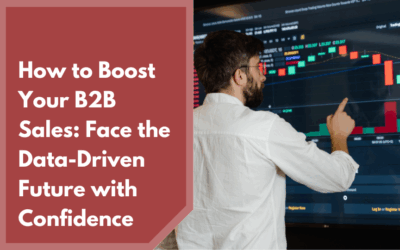In today’s B2B landscape, industrial companies face the clear choice between evolving or risking being left behind. Digital transformation is no longer an old buzzword or a future goal but a current strategy that defines which businesses lead and which ones lag.
For industrial marketers, digital transformation requires carefully evaluating how to keep a customer-first, data-driven mindset to attract, convert, and retain clients. After all, today’s world no longer waits for trade shows or paper brochures to conduct business. Buyers are online, doing their own deep research, and expecting an easy and personalized experience. If your company isn’t meeting them where they are, then they’ll find someone else who will.
Traditional Industry Has Changed
For decades, industrial marketing relied on tried-and-true methods—trade shows, printed brochures, personal referrals, and face-to-face selling. These tactics worked well in an era when digital access was limited and information moved slowly.
Today, the old methods have serious limitations. For example, trade shows and in-person events are labor-intensive and expensive. They restrict your reach to a fixed geography and timeframe, offering little flexibility to scale efforts efficiently. Additionally, with traditional tactics, it’s difficult to know what’s working. You might spend thousands on printed catalogs or event sponsorships but have no clear data tying those investments to lead generation or revenue.
What do these changes mean for you? While traditional methods are more challenging, it doesn’t mean that they are all obsolete. Instead, it requires your company to shift to a mix of new marketing tactics.
What Does Digital Transformation Look Like Today?
Digital transformation isn’t about replacing everything—it’s about building on what works with smarter, more scalable tactics. Here are three practical ways to recognize how transformation is currently unfolding:
From Outbound to Inbound Marketing: Instead of interrupting your audience with cold calls or mailed flyers, inbound marketing invites them in with valuable, targeted content. Industrial buyers want answers and regularly search for them online. If your website hosts educational content, buyer’s guides, or troubleshooting articles, you become the solution they find before they ever talk to sales.
Marketing Automation and CRM Tools: Customer relationship management (CRM) systems help you organize every touchpoint with your prospects from first click to post-sale engagement. Paired with marketing automation, your team can nurture leads, score prospects, and personalize messaging without overwhelming bandwidth. These tools transform your efforts from reactive to proactive.
Data-Driven Decision Making: Analytics powers modern marketing, replacing the old days of guessing what worked. With tools like Google Analytics, HubSpot, or Salesforce, you can pinpoint which campaigns generate the best leads, how users behave on your site, and where prospects drop off in the funnel. These insights let you optimize every stage of the customer journey.
What Real Tactics Drive Results?
With those transformative methods in mind, consider several tactics that industrial companies should implement to remain viable in this shifting landscape.
LinkedIn for B2B Lead Generation: LinkedIn is a goldmine for industrial B2B marketing because this is where many of your buyers live professionally. With targeted ads, insightful content, and sponsored campaigns, you can directly reach engineers, operations managers, or procurement directors—filtered by company size, job title, and even industry focus.
Want to sell to automation leaders? Build a campaign around how your product solves efficiency problems. Offer value, not just a pitch.
SEO for Niche Industrial Products: Search engine optimization (SEO) isn’t just for consumer brands. It’s essential for niche industries where buyers look for highly specific solutions. Target long-tail keywords that reflect what your customers are actually searching for—terms like “low-vibration hydraulic couplings” or “ultra-precision CNC equipment.”
Get your product pages, case studies, and blog posts ranking for those queries, and you’ll attract ready-to-buy visitors with high intent.
Email Campaigns That Support Long Sales Cycles: B2B sales take time, and email marketing keeps you in front of leads across long consideration windows. Create segmented workflows based on funnel stage:
- Top of Funnel: Educational content—e.g., “5 Efficiency Challenges in 2024 Manufacturing”
- Middle of Funnel: Product comparisons, case studies, whitepapers
- Bottom of Funnel: Invitations to schedule demos, pricing guides, or free consultations
Modern tools like Mailchimp, Pardot, or HubSpot make these workflows seamless. Even better, they track opens, clicks, and conversions so you can refine the journey continuously.
How Can Your Company Begin its Digital Transformation Journey?
You don’t have to overhaul your strategy overnight. Start with three focused and strategic steps to build momentum:
1. Conduct a Digital Audit
Evaluate your website, social media, content assets, and email marketing. Are they aligned with your brand? Do they convert? Where do you lose engagement? Identify both quick wins and areas that require deeper investment.
2. Invest in Tools That Scale
You don’t need every marketing platform, but you do need the right ones. Start with a robust CRM and a user-friendly marketing automation tool. These platforms will be the backbone of your lead generation and customer communication.
3. Empower Your Team
Digital tools are only effective when your people know how to use them. Invest in training. Teach your team how to analyze campaign data, launch A/B tests, and create content that converts. A digitally literate team is one of your biggest competitive advantages.
Ready to Embrace the Shift?
Search engines, buyer behaviors, and industry standards are evolving fast—but so can you. Digital transformation is not a one-time project but a mindset and a method for continuously optimizing your marketing, operations, and customer experience.
By implementing modern tactics, using the right tools, and staying true to your company’s unique expertise, your industrial brand can quickly pivot from adapting mode to leading the change.
Are you ready to future-proof your industrial marketing? Talk to one of our expert digital marketers today to see how DirectiveGroup can help your team audit, transform, and scale your efforts.





